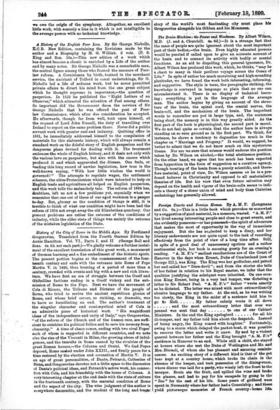A History of the English Poor Law. By Sir George
Nicholls, K.C.B. New Edition, containing the Revisions made by the author and a Biography by H. G. Willink. 2 vols. (P. S. King and Son. 30s.)—This new edition of a work which has almost become a classic is enriched by a Life of the author and by many notes. Sir George Nicholls was a remarkable man, the central figure among those who framed the measure of Poor- law reform. A Cornishman by birth, trained in the merchant service, the assistant of Telford in canal undertakings, Sir G. Nicholls led a life of arduous work, but he never permitted private affairs to divert his mind from the one great subject which he thought supreme in importance,—the question of pauperism. In 1822 he published the "Eight Letters of an Observer," which attracted the attention of Peel among others. So important did the Government deem the services of Sir George Nicholls that he was offered the post of Poor- law Commissioner, which after due consideration he accepted. He afterwards, though far from well, took upon himself, at the request of Lord John Russell, the duty of travelling over Ireland to report on the same problem there. Never did a public servant work with greater zeal and industry. Quitting office in 1851, he immediately addressed himself to the compilation of materials for this elaborate history, which will always remain a standard work on the doleful story of English pauperism and the dangerous plans devised for dealing with it. Tho treatment embraces the whole of English history, and it deals not only with the various laws on pauperism, but also with the causes which produced it and which aggravated the disease. One feels, or reading this long record of unwise legislation, how true is the well-known saying, " With how little wisdom the world is governed!" The attempts to regulate wages, the settlement schemes, the ultra-Protectionism which were intended to help on English trade and agriculture all helped on English pauperism, and this work tells the melancholy tale. The reform of 1834 has, doubtless, left us not a few problems yet, especially when we remember that one out of three of our aged workmen is a pauper to-day. But, gloomy as the condition of things is still, it is terrible to think of what our condition might have been had the reform of 1834 not swept away the old Elizabethan quackery. Our present problems are rather the outcome of the conditions of industry, while the older state of things was mainly the outcome of the mistaken legislation of the State.






































 Previous page
Previous page